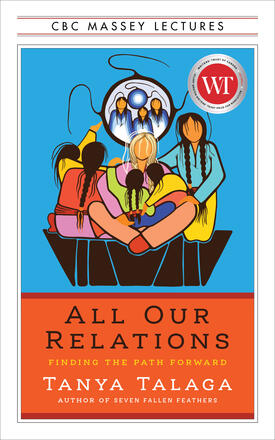
All Our Relations
Finding the Path Forward
Description
In this year’s Massey Lectures, Tanya Talaga, the bestselling author of Seven Fallen Feathers and the 2017–2018 Atkinson Fellow in Public Policy, addresses the mental healthcare and youth suicide crisis in Indigenous communities in Canada and beyond in this powerful call for justice and healing. To learn more about this publisher, click here: http://bit. ly/2zl2V1p
Awards
- Short-listed, Hilary Weston Writers’ Trust Prize for Nonfiction 2018
- Commended, A Globe and Mail Book of the Year 2018
- Short-listed, Nayef Al-Rodhan Prize for Global Cultural Understanding 2018
- Commended, A CBC Book of the Year 2018
- Commended, A Hill Times Book of the Year 2018
- Winner, Blue Metropolis First Peoples Prize, for the whole of her work 2024
Reviews
Talaga’s treatment and explanation of Indigenous people’s trauma is essential reading.
- Irish Times
Talaga’s passion for the topic is palpable as she shares eye-opening stories and heartbreaking statistics . . . Thoughtful and thought-provoking.
- Pavati Magazine
All Our Relations: Finding the Path Forward is an impeccably researched and unflinching documentation of how both colonial histories and ongoing genocidal practices have created the suicide crisis among Indigenous youth across the globe. Tanya Talaga expertly folds together interviews, storytelling, and statistics to bring us directly to the startling truth that Indigenous youth are fighting to find themselves through the multiple separations forced on them by settler states: separation of parents from children, separation of peoples from their land, and separation of tongues and hearts from their languages and traditions. All Our Relations is a call to action and a testament to the strength and tenacity of Indigenous people around the world.
- Hilary Weston Writers’ Trust Prize for Nonfiction Jury Citation
This book is both moving and effective; it creates the space for readers to understand the complexity of these issues . . . An excellent read.
- Ottawa Review of Books
An essential work of nonfiction . . . Through storytelling, on-the-ground reporting, literature surveys, and plenty of statistics, Talaga demonstrates the extent to which Indigenous children continue to live under the full weight of colonial history . . . All children, she writes, ‘need to know who their ancestors are, who their heroes and villains are.’ In All Our Relations, Talaga restores that basic right to Indigenous children who have been robbed of it. And the rest of us, as an epigraph from author Thomas King makes clear, no longer have the excuse of saying we haven’t heard this story. Talaga alone has told it twice now.
- Quill and Quire